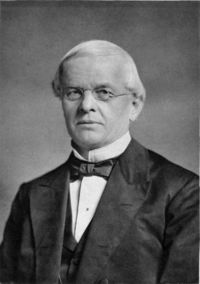أوگوست ديلمان
كريستيان فريدرش أوگوست ديلمان Christian Friedrich August Dillmann (25 أبريل 1823 – 7 يوليو 1894) كان مستشرقاً ألمانيا ودارس للكاتب المقدس.
أوگوست ديلمان Christian Friedrich August Dillmann | |
|---|---|
 | |
| وُلِد | 25 أبريل 1823 إلنگن، الكونفدرالية الألمانية |
| توفي | 7 يوليو 1894 (aged 71) برلين، الامبراطورية الألمانية |
| الوظيفة | مستشرق ودارس للكتاب المقدس |
| العرق | ألماني |
| التعليم | جامعة توبنگن |
| التوقيع | |
. . . . . . . . . . . . . . . . . . . . . . . . . . . . . . . . . . . . . . . . . . . . . . . . . . . . . . . . . . . . . . . . . . . . . . . . . . . . . . . . . . . . . . . . . . . . . . . . . . . . . . . . . . . . . . . . . . . . . . . . . . . . . . . . . . . . . . . . . . . . . . . . . . . . . . . . . . . . . . . . . . . . . . . .
حياته
كان ابن ناظر مدرسة في ڤورتمبرگ، وولِد في إلنگن. وتعلم في جامعة توبنگن، حيث أصبح تلميذ وصديق هاينرش إڤالد، ودرس على يدي فرديناند كريستيان باور، إلا أنه لم ينضم لمدرسة توبنگن الحديثة. For a short time he worked as pastor at Sersheim, near his native place, but he soon came to feel that his studies demanded his whole time.[1]
He devoted himself to the study of Ethiopic manuscripts in the libraries of پاريس ولندن وأكسفورد، and this work caused a revival of Ethiopic study في القرن 19. في 1847 و 1848 أعد كتالوگات للمخطوطات الحبشية في المتحف البريطاني (الآن المكتبة البريطانية) ومكتبة بودليان في أكسفورد. He then set to work upon an edition of the Ethiopic bible.[1]
عاد إلى توبنگن في 1848، وفي 1853 عيّن أستاذ فوق العادة. ولاحقاً أصبح أستاذ الفلسفة في جامعة كيل (1854), وأستاذ اللاهوت في جامعة گيسن (1864) و جامعة همبولت في برلين (1869)، حيث خلف إرنست ڤلهلم هنگشتنبرگ.[1]
أعماله
In 1851 he had published the "Book of Enoch" in Ethiopian (German, 1853; English, 1893), and at Kiel he completed the first part of the Ethiopic bible, Octateuchus Aethiopicus (1853–55). In 1857 appeared his Grammatik der äthiopischen Sprache (2nd edition by Carl Bezold, 1899); in 1859 the "Book of Jubilees"; in 1861 and 1871 another part of the Ethiopic bible, Libri Regum; in 1865 his great Lexicon linguæ aethiopicæ; in 1866 his Chrestomathia aethiopica.
Always a theologian at heart, he returned to theology in 1864. His Giessen lectures were published under the titles, Ursprung der alttestamentlichen Religion (1865) and Die Propheten des alten Bundes nach ihrer politischen Wirksamkeit (1868). In 1869 appeared his commentary on Hiob, (4th edition 1891) which stamped him as one of the foremost Old Testament exegetes.
His renown as a theologian was mainly founded on the series of commentaries, based on those of August Wilhelm Knobel's Die Genesis (Leipzig, 1875); Die Bücher Exodus und Leviticus, 1880; Die Bücher Numeri, Deuteronomium und Josua, with a dissertation on the origin of the Hexateuch, 1886; Der Prophet Jesaja, 1890. In 1877 he published the "Ascension of Isaiah" بالإثيوپية واللاتينية. He was also a contributor to Daniel Schenkel's Bibellexikon, Brockhaus's Conversationslexikon, and Johann Jakob Herzog's Realencyklopädie. His book on Old Testament theology, Handbuch der alttestamentlichen Theologie, was published by Rudolf Kittel in 1895.[2]
الهامش
- This article incorporates text from a publication now in the public domain: Chisholm, Hugh, ed. (1911). دائرة المعارف البريطانية (eleventh ed.). Cambridge University Press.
{{cite encyclopedia}}: Cite has empty unknown parameter:|coauthors=(help); Missing or empty|title=(help) - قالب:BBKL
- George L. Robinson, "August Dillmann (Obituary)", in: The Biblical World 4/4 (1894), pp. 244–258.
- ^ أ ب ت ADB:Dillmann, August In: Allgemeine Deutsche Biographie (ADB). Band 47, Duncker & Humblot, Leipzig 1903, S. 699–702.
- ^ Handbuch der alttestamentlichen Theologie OCLC WorldCat.